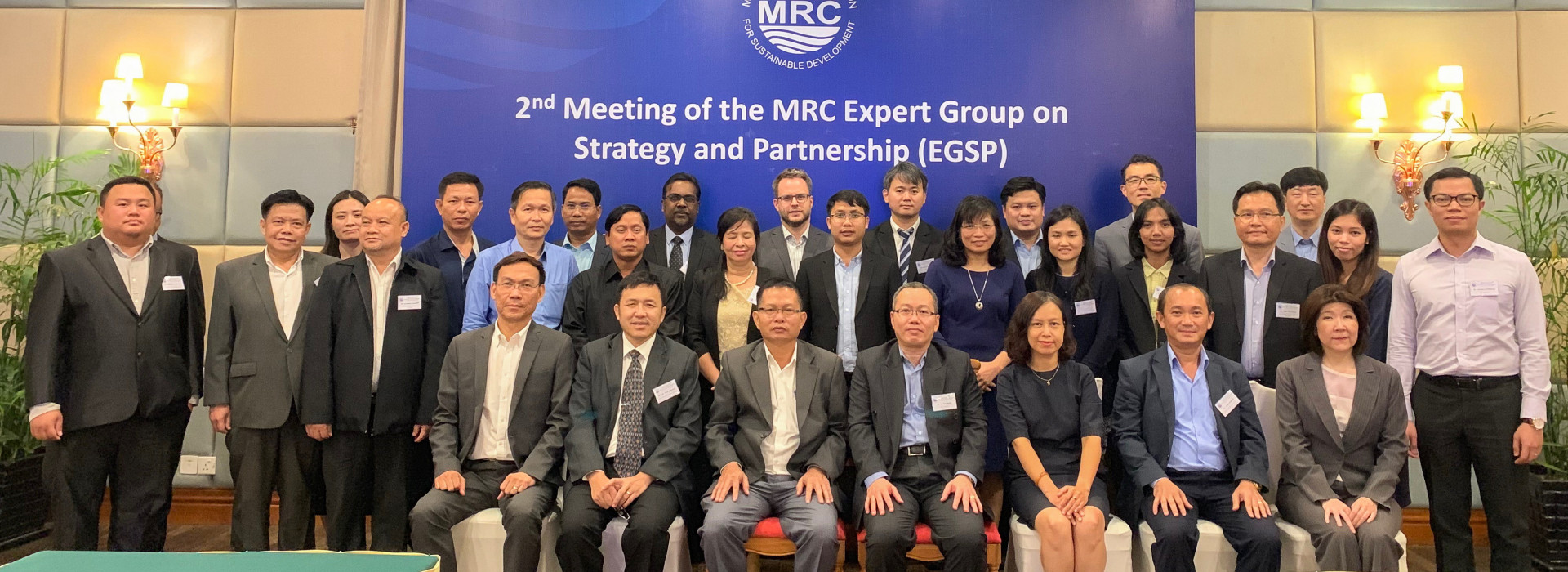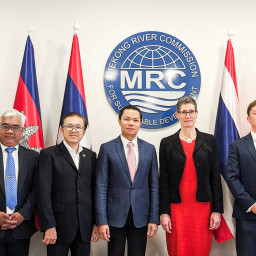Mekong related regional cooperation frameworks recommend more joint efforts, coordination to boost effectiveness
Phnom Penh, Cambodia, 16 August 2019 – The importance of synergizing programs of activities of various Mekong related regional frameworks and improved mechanisms for information sharing and collaboration in overcoming the challenges of becoming a more resilient and sustainable Mekong region were some of the key recommendations born out of a one-day meeting of the Mekong River Commission’s Expert Group on Strategy and Partnership.
A highly dynamic geo-political region experiencing rapid growth and development and home to one of the world’s great rivers, the Mekong region houses a dozen of major inter-governmental cooperation frameworks that have gone uncoordinated. In order to ensure synergies and explore opportunities for improved coordination among these frameworks in the water and related sectors of the Mekong River basin, the MRC, for the first time, convened this meeting yesterday.
“I’m pleased that for the first time we could bring together all the major players in the Mekong region to discuss how to best work together to serve our people and the governments,” said Mr. Te Navuth, Chair of the meeting and Permanent Vice-Chairman of the Cambodia National Mekong Committee.
At the meeting, held in the Cambodia’s capital city Phnom Penh and brought together senior representatives from the Mekong countries and seven major Mekong related regional cooperation frameworks, the representatives discussed the current status of their ongoing and future projects and programs in the water, energy, disaster and environment related fields in supporting the Mekong countries.
The discussions revealed that overlapping and even duplication of activities existed.
But Dr. An Pich Hatda, who heads the MRC Secretariat, acknowledged that “overlapping is unavoidable, but what is vital is to create a more coherent and effective coordination mechanism that ensures joint efforts”.

A representative from the Lancang Mekong Water Resources Cooperation Center of the Lancang-Mekong Cooperation spoke at the meeting yesterday about LMC’s ongoing and future projects and programs in the Mekong region.
The representatives from the ASEAN Secretariat, ADB that funds the Greater Mekong Subregion Economic Cooperation Program, Ayeyawady-Chao Phraya-Mekong Economic Cooperation Strategy, Mekong-Japan Cooperation, Mekong-Korea Cooperation, Lower Mekong Initiative and Lancang-Mekong Cooperation exchanged ideas on how to bring out this coordination mechanism.
Through discussions, they agreed to continue the dialogue, where the representatives will meet regularly through the MRC’s led Expert Group on Strategy and Partnership. They also agreed to work on strategic collaboration and joint technical work in many areas.
The areas include a co-hosting water security dialogue and joint assessment of drought impacts (MRC-ASEAN); integrating the MRC transboundary sustainability guidelines and tools into national systems (MRC-ADB); further joint studies and enhanced information sharing and notification (MRC-LMC); a trilateral cooperation project on water (MRC-ACMECS-Australia); knowledge sharing program (MRC-Korea); and continuing flood, drought, irrigation and other cooperation (MRC-Japan).
The MRC’s Expert Group on Strategy and Partnership is composed of senior representatives from the four member countries, particularly from foreign affairs ministries and international cooperation departments of key line agencies. Representatives from the MRC partners are invited as observers and participants depending on topics of discussion.
The Group has three primary functions.
First, it provides strategic and diplomatic advice and recommendations on complex transboundary water management issues to the management and policy making body of the MRC – the Joint Committee and Council.
Second, it offers input to the review and preparation of MRC Strategic Plan and other strategies from strategic, cooperation and partnership perspectives.
Third, it assists the Commission in enhancing and maintaining partnerships and international cooperation, including joint activities, information sharing mechanisms and prevention of duplication of activities, with other Mekong-related regional frameworks and initiatives with the aim of strengthening MRC’s role and work.
This Expert Group on Strategy and Partnership, together with three other groups that were established in 2017 by the MRC Joint Committee, replaces the Commission’s former steering committees, advisory bodies and working groups who guided programs and projects.
Note to editors:
The MRC is an intergovernmental organization for regional dialogue and cooperation in the lower Mekong river basin, established in 1995 based on the Mekong Agreement between Cambodia, Lao PDR, Thailand and Viet Nam. The organization serves as a regional platform for water diplomacy as well as a knowledge hub of water resources management for the sustainable development of the region. Both China and Myanmar are Dialogue Partners of the MRC.
- END -





